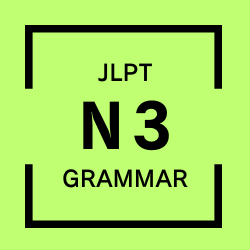例文
①彼は家の掃除中に、去年失くした財布を見つけた。
In the middle of cleaning his house, he found his wallet, which he had lost last year.
②今週中にレポートを提出してください。
Please submit your report by the end of this week.
③ゴミが街中にあります。
There is garbage all over the city

意味・用法
①動作や作用を表す名詞に接続し、その動作や作用の間という意味を表す。読み方は必ず「ちゅう」
②期間を表す名詞に接続し、その期間や期間内という意味を表す。読み方は「ちゅう」の場合と「じゅう」の場合がある
③場所や範囲を表す名詞に接続し、その場所や範囲のあらゆるところという意味を表す。読み方は必ず「じゅう」
英語
① "N+chuu" is connected to a noun that describes an action or process and means in the middle of that action or process.
② "N+chuu/juu" is connected to a noun that describes a period of time and means a certain point within "N" or throughout the period of time.
③ "N+juu" is connected to a noun that describes a place or scope, and expresses the meaning of everywhere in that place or scope.
詳しい文法解説 grammar point
▷ 用法①:読み方は「ちゅう」
動作や作用を表す名詞と使われ、その動作や作用の間という意味で使われる場合、読み方は必ず「ちゅう」です。
一所に使われる名詞の例:
仕事、休憩、工事、営業、準備、会議、電話、授業、運転、etc.
1. 彼は今、会議中です。
He is in the middle of a meeting right now.
2. 授業中はスマホを使わないでください。
Please do not use your phone while in class.
▷ 用法②:読み方は「ちゅう」か「じゅう」
期間を表す名詞と使われる場合、「ちゅう」と読むか「じゅう」と読むかは名詞によって異なり、どちらの読まれ方をするものもあります。
「じゅう」と読むもの
今日中、今晩中、今年中、明日中、一日中、一晩中、一年中、etc
「ちゅう」とも「じゅう」とも読むもの
今週中、今月中、来週中、来月中、etc,
「ちゅう」と読むもの
午前中
※「午前中」という言い方はするが、「午後中」という言い方は基本使われない。
4. 今月中にこの仕事を終わらせたい。
I want to finish this job by the end of this month.
5. 昨日は一日中忙しかった。
Yesterday I was busy all day.
▷ 用法③:読み方は「じゅう」
場所を表す名詞や範囲を表す名詞と使われる場合は、常に「じゅう」と読みます。
一所に使われる名詞の例:
世界、日本、学校、会社、親戚、etc.
6. このドラマは世界中で人気です。
This drama is popular all over the world.
7. あなたのことが、会社中で噂となっていますよ。
There are rumors about you all over the company.
▷ 「に」がある場合とない場合
「その期間内のある一点に」という意味で使う場合や、何等かの期限などを言う場合は「に」を伴いますが、「その期間の範囲ずっと」という意味で使う場合は「に」は伴いません。
接続 formation
N + 中
※「考え中」や「話し中」のように、一部 V(ます)に接続する場合もある。
関連文法 related grammar

~最中に
- JLPT N3 Grammar

~途中で/途中に
- JLPT N3 Grammar

~間/間に
- JLPT N3 Grammar
例文 example sentences
用法①
・今日、お店の営業中に警察の人が来ました。
Today, a police officer came to my store while it was open for business.
・旅行中に携帯を盗まれてしまった。
My cell phone was stolen while I was traveling.
・演奏中は静かにしてください。
Please be quiet during the performance.
・今ダイエット中だから、甘い物はあんまり食べないようにしているんだ。
I'm on a diet right now, so I try not to eat too many sweets.
・お店の前に準備中という札がかかっていました。
There was a sign in front of the restaurant saying that it was being prepared.
用法②:
・昨日は寝ずに一晩中友達と夢を語り合った。
Yesterday we didn't sleep and talked about our dreams with friends all night long.
・来月中に新しい会社の人事が発表されるだろう。
New company appointments will be announced within the next month.
・今日は友達の買い物に一日中付き合ったから、疲れてしまった。
I'm tired today because I spent all day with my friend shopping.
・今週中にJLPTの試験結果が届くはずです。
You should receive your JLPT exam results by the end of this week.
用法③:
・その新しいドラマは日本中で話題となった。
The new drama was the talk of the town all over Japan.
・彼は若い時に世界中を旅行したそうだ。
I heard that he traveled all over the world when he was young.
・最近は街中に監視カメラが設置されている。
Surveillance cameras have recently been installed throughout the city.
・彼は家中に響く大きな声で、息子に対してどなった。
He yelled at his son in a loud voice that echoed throughout the house.
<参考文献>
・杉村泰『コーパスを使った日本語教授法の開発に向けて―外国人日本語教師の文法性判断のために―』
・鈴木豊『字音形態素「チュウ(中)」と「ジュウ(中)」の関係について』
・小柳昇『〈時名詞〉+中(チュウ)』と『〈時名詞〉+中(ジュウ)』の使い分け―日本人は〈トキ〉をどのように捉えて言語化しているか―

If you have any questions about this grammar, please comment below.
